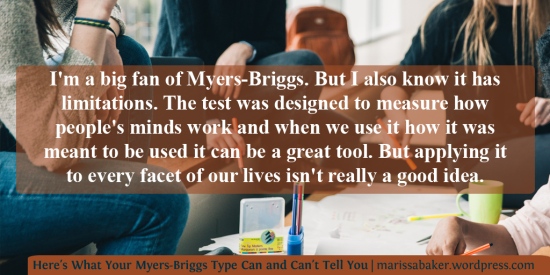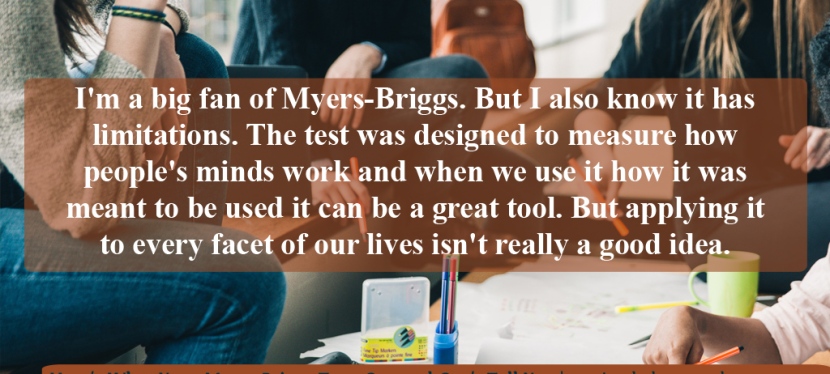It’s no secret I’m a big fan of Myers-Briggs®. I’ll defend it against people who say it’s useless, write and re-write posts trying to come up with the simplest introduction to function stacks ever, and spend my time musing about how type influences both real people and fictional characters. But as much as I like the Myers-Briggs® system of personality types, I also know there are things it’s not meant to do.
In fact, applying Myers-Briggs® wrongly is one of the biggest reasons it has come under so much criticism. For example, you can find quite a few articles online that argue Myers-Briggs® is basically useless in a work environment. They’ll tell you it’s not a good indicator of job performance nor is it all that useful for screening potential employees. But that shouldn’t come as a surprise, considering those aren’t the test’s purpose. And it’s unfair to dismiss a test for not doing something it wasn’t meant to do in the first place.

So what is the Myers-Briggs® test supposed to tell you? And just how much can we apply what we learn from finding our type to real life?
This Is Your Brain On Decision Making
The Myers-Briggs® test is designed to measure how people’s minds work. It describes their preferred mental processes or “cognitive functions” (to use the technical term). Contrary to what so many critics of the test think, it doesn’t force people into dichotomies. Rather, each type has a “stack” of preferred functions. So an ENFJ type isn’t someone who’s 100% extroverted, intuitive, feeling, and judging. They’re a type that prefers making decisions with Extroverted Feeling, learning new things with Introverted Intuition, and then also uses Extroverted Sensing and Introverted Thinking to a lesser extent (click here to learn how we get from the four letter type to the functions).
These characteristics of Myers-Briggs® theory means that taking the test can help you:
- Understand how you learn new information. Your intuitive or sensing side is what we call a “perceiving” function. That’s the mental process you use most comfortably when taking in perceptions about the world around you. Intuitives are a much smaller percentage of the population than sensors, and learning how this difference functions can play a huge role in recognizing why some people seem so different from us.
- Find how you make decisions most effectively. Your thinking or feeling “judging” function describes the mental process you use most comfortably when making decisions. A practical application of this can be found in gender-role strain. There’s a push in our cultures for women to make “feeling” based judgements and men to be more detached and “thinking.” But when F-type men and T-type women are pushed to use a decision making function that their brains don’t like it can be frustrating and confusing. Learning about personality types can be a huge help for people in those situations.
- See other’s perspectives. Really recognizing that other people process their thoughts differently than us can be an eye-opening experience. For example, whether you prefer Sensing or Intuition influences your worldview, which can help explain why an N-type visionary inventor and S-type conservative traditionalist seem to be speaking a different language (basically the plot of Captain America: Civil War).
- With self-knowledge and growth. One of the most common first reactions to finding your best-fit Myers-Briggs® type is, “Wow, I can’t believe someone finally understands me.” Knowing how our minds work can be a major confidence-booster and an eye-opening step toward personal growth.
Here Are A Few Leaps We Can Make
Because Myers-Briggs® types describes how our minds function, we can draw some pretty strong inferences about how different types will typically act and react. This is what most type descriptions you find online (including things like my INFJ User Guide) are doing. We look at how the functions work together, talk with many different people who are examples of the type we’re looking at, and then share general principles about that type. These principles won’t all be 100% true for every individual, but a good type description should mostly ring true for people of that type.
Using what Myers-Briggs® tells us about how people’s minds work, we can usually describe:
- How someone of a given type will react to stressful situations. Our fourth function, the one that we’re least comfortable with, is typically triggered by stress. We can use that to understand why we act so much differently under stress and try out stress-relieving tips that other people who share our type find helpful (Susan Storm has an excellent book on this topic called Tranquility by Type that I recommend you take a look at).
- Ways you can work on personal growth. People’s types develop differently depending on a whole host of factors, but most of us have a tendency to stay in our favorite mental process as much as possible. That means our less preferred functions can be a good place to start for personal growth, and learning about Myers-Briggs® can give you some guidelines for things people with your type can work on.
- Things we’re looking for in relationships. While Myers-Briggs® types aren’t all that useful in helping us find a “perfect match” (see below), your type does help explain what you’re looking for from your relationships. FJ types tend to need friends who will provide emotional support. EP types often look for people who will go on adventure with them. NT types crave people who will have intellectual discussions with them. Any two types can get along well together, but Myers-Briggs® helps with understanding each other’s needs and wants in a relationship.

Sorry, Can’t Help You There
There are some things your Myers-Briggs® type simply can’t help you with. Unfortunately, people often try to use it for these things anyway. I suspect part of this is about making money — if you can sell an organization on the idea that Myers-Briggs® with help with screening and interviewing employees you’ll make a whole lot more money than you would just from helping growth-minded individuals. But it’s also in large part about people getting carried away with trying to apply a system they like to every situation they can think of. If it works so well for helping me understand how my mind works, then it should help me find love and a perfect job! Right?
Keep type theory’s limitations in mind and use caution when (or avoid entirely) applying Myers-Briggs® theory to:
- Make major career decisions. While it might be true that people of a given personality type tend to prefer certain careers, those are just generalizations. Being an ENTP doesn’t automatically mean you’ll be a fantastic entrepreneur, sales manager, or producer. Nor does being an introvert disqualify someone for a career in customer service. There’s too much variation among individuals to use Myers-Briggs® for more than giving general guidelines for what type of work a given type might find fulfilling.
- Find romance. Spend any time at all in circles discussing personality types and the conversation will inevitably turn to looking for love with the MBTI. Everyone wants to know what their “ideal type-match” is. And some writers will be happy to tell you (David Keirsey, for example, thinks your ideal match only shares your S-N preference). But in real-life, willingness to understand each other is a much better predictor of relational success than personality type. Knowing each other’s type can help with that. But there’s no magic formula for finding your perfect match using Myers-Briggs.
- Excuse character flaws. It’s tempting to blame our personality types for our less positive qualities. A chronically late ENFP might blow it off by saying they’re a Perceiving type so they can’t be expected to keep track of time. An overly critical ISTJ might excuse their put-downs of other people as a trait of straight-forward Extroverted Thinking. But Myers-Briggs® types don’t determine whether you’re a trustworthy, reliable, or kind person. You do.
- Make rigid statements. People are individuals. And any good personality test acknowledges that. We can’t say things like, “All ISFPs are artists” or “ESFJs are always people pleasers” and expect to be right. Unfortunately, this sort of things usually deteriorates pretty quick into typeism (yes, that’s a thing). That’s why you’ll see incorrect statements like, “INTJs are cold and heartless” or “You can’t trust an ESFP to follow through on anything” tossed around as fact.
Myers-Briggs® is a fun, useful tool when you use it for things that it’s good at. Misapplying it isn’t any more helpful than trying to use a hammer as a screwdriver (something I’ve actually tried and can report does not work too well). We can definitely use Myers-Briggs® to gain a greater understanding of ourselves and the people around us, but let’s also keep its limitations in mind and resist the urge to apply it incorrectly.

As an INFJ I have a keen interest in MBTI, and it can be tempting to allow the theories to excuse my flaws rather than simply offer insight. I agree that romantic choices shouldn’t be made based on MBTI! I am married to an ESTJ, which isn’t ‘supposed’ to be a perfect match, but he’s great! 🙂
LikeLiked by 1 person